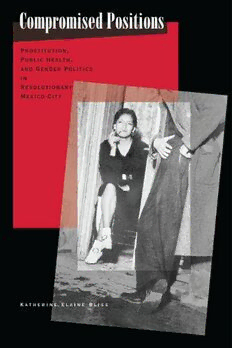
Compromised Positions: Prostitution, Public Health, and Gender Politics in Revolutionary Mexico City PDF
260 Pages·2001·2.363 MB·English
Most books are stored in the elastic cloud where traffic is expensive. For this reason, we have a limit on daily download.
Preview Compromised Positions: Prostitution, Public Health, and Gender Politics in Revolutionary Mexico City
Description:
"A nuanced study of how revolutionary politics tried, but ultimately failed, to eradicate prostitution in Mexico City because of its reluctance to promote changes in masculine sexuality and its refusal to include women, particularly prostitutes, in its revolutionary family. This book makes a significant and original contribution to Mexican historiography, one that will challenge the fundamental willingness of revolutionary leaders to take gender issues seriously." --Donna J. Guy, Ohio State University To illuminate the complex cultural foundations of state formation in modern Mexico, Compromised Positions explains how and why female prostitution became politicized in the context of revolutionary social reform between 1910 and 1940. Focusing on the public debates over legalized sexual commerce and the spread of sexually transmitted disease in the first half of the twentieth century, Katherine Bliss argues that political change was compromised time and again by reformers' own antiquated ideas about gender and class, by prostitutes' outrage over official attempts to undermine their livelihood, and by clients' unwillingness to forgo visiting brothels despite revolutionary campaigns to promote monogamy, sexual education, and awareness of the health risks associated with sexual promiscuity. In the Mexican public's imagination, the prostitute symbolized the corruption of the old regime even as her redemption represented the new order's potential to dramatically alter gender relations through social policy. Using medical records, criminal case files, and letters from prostitutes and their patrons to public officials, Compromised Positions reveals how the contradictory revolutionary imperatives of individual freedom and public health clashed in the effort to eradicate prostitution and craft a model of morality suitable for leading Mexico into the modern era.
See more
The list of books you might like
Most books are stored in the elastic cloud where traffic is expensive. For this reason, we have a limit on daily download.
